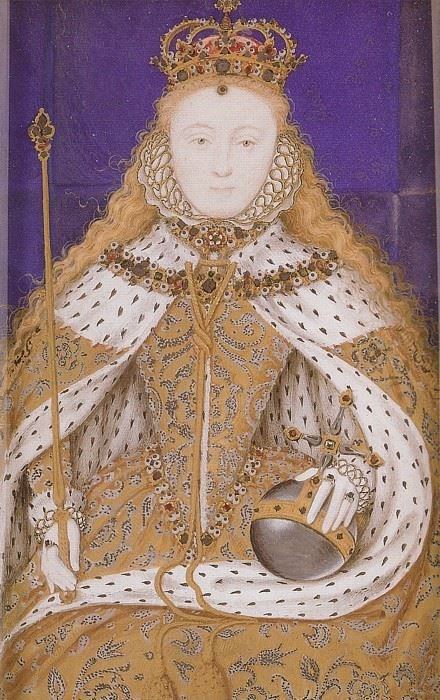 Queen Elizabeth I coronationNicholas Hilliard [Public domain], via Wikimedia CommonsMark Twain’s book, The Prince and the Pauper, tells a fictitious story of Prince Edward VI switching places with a pauper. In reality Prince Edward VI of England, the half brother of Elizabeth I, reigned for only six years dying when only fifteen years old. After Edward, Elizabeth’s half sister, Mary Tudor, reigned for five years. Elizabeth’s reign came next lasting for nearly 40 years. Queen Elizabeth I of England has always been an extremely fascinating figure in history. Her success as queen can be attributed to her difficult childhood, her education, and her devotion to her country.
Queen Elizabeth I coronationNicholas Hilliard [Public domain], via Wikimedia CommonsMark Twain’s book, The Prince and the Pauper, tells a fictitious story of Prince Edward VI switching places with a pauper. In reality Prince Edward VI of England, the half brother of Elizabeth I, reigned for only six years dying when only fifteen years old. After Edward, Elizabeth’s half sister, Mary Tudor, reigned for five years. Elizabeth’s reign came next lasting for nearly 40 years. Queen Elizabeth I of England has always been an extremely fascinating figure in history. Her success as queen can be attributed to her difficult childhood, her education, and her devotion to her country.
First, Elizabeth’s difficult childhood began on September 7, 1553, born to King Henry VIII and Anne Boleyn. With the birth of Elizabeth, Henry’s disappointment resulted in the beheading of Anne Boleyn. Because Henry VIII desired a male heir on the throne, he had several wives, getting rid of each one when they failed to produce a son. After Henry beheaded Anne Boleyn, Elizabeth’s life changed drastically. She had many step mothers and was treated poorly. While still quite young, her half sister, Mary, who reigned as queen at the time, sent Elizabeth to prison since she thought that Elizabeth would try to overpower her. Elizabeth’s difficult childhood shaped the strong queen she became.
Second, Elizabeth’s education influenced her future greatly. After the beheading of her mother, her stepmother, Katharine Parr, had the brightest scholars teach Elizabeth. Elizabeth studied history, French, math, Latin, geography, Greek, astronomy, and Italian. History quickly became her favorite subject. She loved to ride horses, hunt, dance, and play music on the lyre, the virginal, and the lute. Because of her well-rounded education, Elizabeth loved seeing Shakespeare’s plays. Her intelligence and skill absolutely amazed her tutors. Other languages she learned included Spanish, Welsh, and Flemish. Elizabeth’s excellent education made her a strong and wise queen.
Third, Elizabeth’s devotion to her country brought her wonderful success. In 1558, the year that Elizabeth became queen, she fell to her knees and said, “A Domino factum est ilud et est mirabile in oculus nostris,” in Latin, which in English means, “This is the doing of the Lord, and it is marvelous in our eyes.” When Elizabeth became queen, England had drought, religious unrest, poverty, high prices, overcrowding in London and poor relations with foreign countries. One observer wrote, “I never saw England weaker in strength, men, and riches….there was nothing but fining, beheading, hanging, quartering, and burning; taxing, levying, pulling down of bulwarks at home, and beggaring and losing out strongholds abroad.” During her reign Queen Elizabeth brought England back to prosperity. Elizabeth also felt so loyal to her country that she never married. As queen she explained, “I am already bound unto a husband which is the Kingdom of England.” She began to settle religious conflicts and improve her country by listening to the people of England. Instead of beheading or burning people at the stake as her sister had done, she negotiated and worked hard to make peace within her country. When 68 years old, Elizabeth told parliament, “Though God hath raised me high, yet this I account the glory of my crown, that I have reigned with your loves….It is not my desire to live or reign longer than my life and reign shall be for your good. And though you have had, and may have, many mightier and wiser princes sitting in this seat, yet you never had, nor shall have any that will love you better.” For generations to come, the people in England would remember her speech as Elizabeth’s Golden Speech. This devotion to her people brought her admiration and loyalty.
Elizabeth’s difficult childhood, her education, and her devotion to her country helped her to become a powerful and much admired queen of England. Because of Elizabeth, England grew into a powerful country, defeated Spain, saved Scotland for Protestants and brought the Irish uprising down. Even her enemies such as Pope Sixtus V admired her saying, “She is certainly a great Queen and were she only a Catholic she would be our dearly beloved. Just look at how well she governs! She is only a woman, only mistress of half an island, and yet she makes herself feared by Spain, by France, by the Empire, by all.” She died on March 24, 1603. Elizabeth I, the highly regarded queen, changed England forever.
Page created on 2/20/2008 12:00:00 AM
Last edited 12/9/2024 3:32:05 PM
Green, Robert. Queen Elizabeth I. New York: Franklin Watts, 1997.
Greenblatt, Miriam. Elizabeth I and Tudor England. New York: Benchmark Books, 2002.
Havelin, Kate. Elizabeth I. Minneapolis: Lerner Publications Company, 2002.
Thomas, Jane. Behind the Mask: The Life of queen Elizabeth I. New York: Clarion Books, 1998.
Weatherly, Myra. Elizabeth I: queen of Tudor England. Minneapolis: Compass Point Books, 2006.
